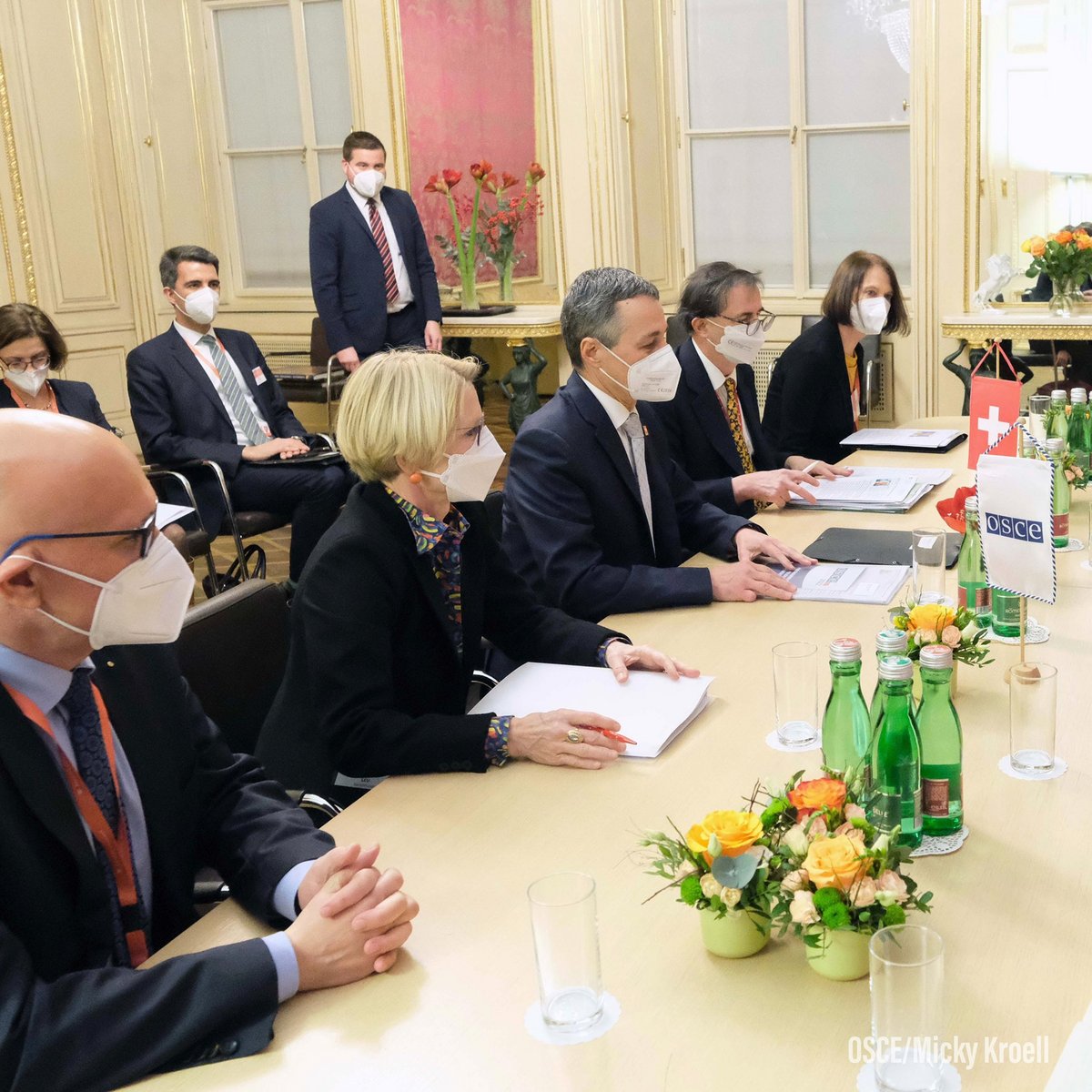Constructive steps for negotiated solutions
Switzerland wants to strengthen the OSCE with its Action Plan 2022–2025
by Eva-Maria Föllmer-Müller
In the same week that the talks between Russia and the USA in Geneva, the dialogue between Russia and NATO in Brussels and talks with Russia within the framework of the Organisation for Security and Co-operation in Europe (OSCE) in Vienna as well as other talks have taken place, Switzerland is taking constructive steps and offering a hand. This shows once again that Switzerland can go its own independent way.
Firstly, unlike the governments of other Western countries, the Federal Council will participate in this year’s Winter Olympics in China, depending on the pandemic situation.*
Secondly, on 12 January 2022, the Federal Council announced that Switzerland and Russia intend to expand their cooperation in the agricultural sector. The focus will be on three areas: bilateral trade, plant health and veterinary matters. A declaration of intent is to be signed by both countries by spring. Russia is the sixth largest export market for agricultural products from Switzerland. Exports of agricultural products to Russia amount to about CHF 250 million per year. Pro Memoria: Switzerland has not joined the sanctions against Russia, but has merely stated that it will ensure that Switzerland is not used to circumvent the sanctions.
Action Plan 2022–2025
Thirdly: On 13 January 2022, the Federal Department of Foreign Affairs, FDFA, presented its “Action Plan 2022-2025” to strengthen the effectiveness of the OSCE. This took place on the occasion of Federal President Ignazio Cassis’ inaugural visit to his counterpart Alexander van der Bellen in Vienna, the seat of the OSCE. Cassis also met with the current Chairman of the OSCE, Polish Foreign Minister Zbigniew Rau, and the Secretary General of the OSCE, Helga Schmid, and presented the Action Plan to them as part of the Foreign Policy Strategy 2020-2023. This at a time when the security situation in Europe has recently been steadily deteriorating. This mood has also been reflected in the OSCE since 2014. The Action Plan states: “Forums for discussion and negotiation, such as the Permanent Council or the Forum for Security Co-operation, are today used less for substantive debate and developing appropriate solutions than they are for ‘megaphone diplomacy’ and sterile exchanges of statements. This runs counter to the spirit of dialogue, which is the OSCE trademark.” (p. 19) Switzerland now wants to counteract this. For, as President Cassis rightly writes in the foreword: “It is only possible to ensure peace and security in Switzerland if peace is also maintained in Europe and beyond.”
Loss of trust prevents solutions
With its action plan “Switzerland is committed to preserving and reviving the OSCE’s achievements”. This is intended to restore and strengthen the OSCE’s room for manoeuvre, which has become increasingly limited in recent years, mainly due to the loss of trust between states.
Specifically, Switzerland plans “participating in building a dialogue process ahead of Helsinki 2025, strengthening arms control and thus trust between participating states, and increasing capacities for conflict resolution”.
High credibility
That this is to be done at the level of a concrete strengthening of the OSCE is not coincidental, for, as the chapter “Security and Trust in Europe” of the Action Plan states: The OSCE is the only regional security organisation that brings together East and West. It includes Russia and the United States on an equal footing [emphasis ef], making it the natural forum for dialogue and confidence-building”. (p. 12)
For Switzerland, the OSCE has always been a cornerstone of the European security architecture; it is the only country so far to have held the OSCE Chairmanship twice, in 1996 and 2014. Within the OSCE, Switzerland enjoys a high degree of credibility as a bridge builder. In the tradition of its Good Offices, it was already able to contribute to solutions between the blocs as a neutral state during the Cold War or, as since the conflict in eastern Ukraine, to initiate important dialogue and negotiation processes. In the 1970s and 1980s, Switzerland also frequently cooperated with other “neutral and non-aligned states”. •
* Unfortunately, on 26 January, the Federal Council had to forgo its participation due to the uncertain pandemic situation in Switzerland.
Sources:
OSCE Action Plan 2022–2025 of 13 January 2022, Federal Department of Foreign Affairs FDFA, www.eda.admin.ch
FDFA media release of 13 January 2022
Federal Council media release of 12.1.2022
CSCE and OSCE
ef. The year 2025 will mark the 50th anniversary of the adoption of the Helsinki Final Act. On 1 August 1975, the heads of state and government of 35 countries of the Western and Eastern blocs signed the Final Act on the Conference on Security and Co-operation in Europe (CSCE), including Switzerland. The CSCE was founded at that time as a multilateral forum for dialogue and negotiations between East and West. After the end of the Cold War in 1994, it was renamed the OSCE (Organisation on Security and Co-operation in Europe). Today, the OSCE comprises 57 participating States around the world.
